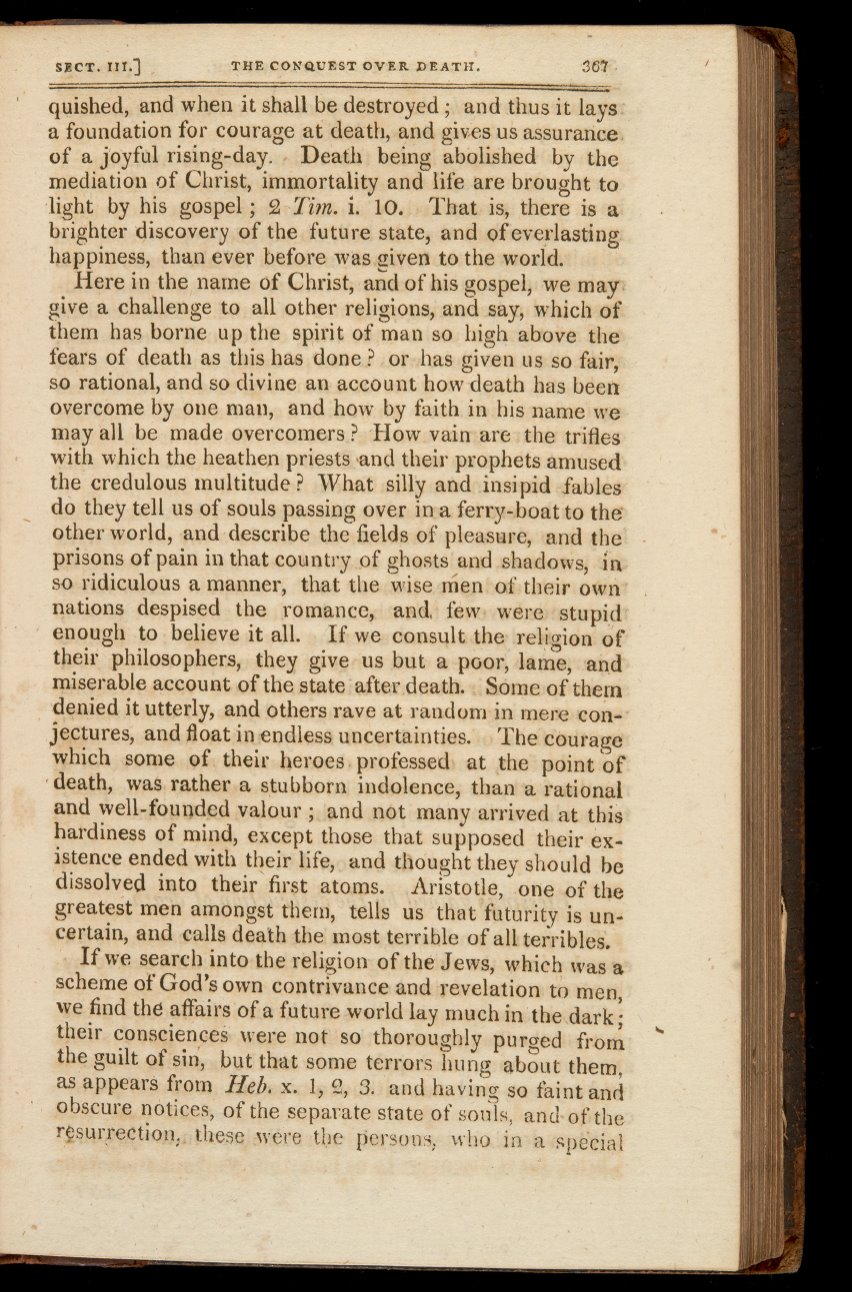

SECT.
III.]
THE CONQUEST OVER
DEATH.
367
quished,
and
when
it
shall
be
destroyed
;
and
thus
it
lays
a foundation
for courage
at
death, and
gives us
assurance
.
of
a
joyful rising
-day.
Death
being abolished
by
the
mediation
of
Christ, immortality and
life
are brought to
light
by
his
gospel
;
2
Ì
im.
i.
10.
That
is,
there
is
a
brighter
discovery
of
the
future
state, and
of
everlasting
happiness, than ever before
was given
to the world.
Here
in
the name
of
Christ, and
of
his gospel, we
may
give
a challenge
to
all
other
religions,
and
say,
which
of
them
has
borne
up the
spirit of
man
so
high above
the
fears
of death
as
this has done
?
or has
given
us so
fair,
so
rational, and
so
divine
an
account
how
death
has
been
overcome
by
one man,
and
how
by
faith
in his
name
we
may
all be
made overcomers
?
How vain are the
trifles
with which the
heathen priests and
their
prophets amused
the credulous multitude
?
What
silly
and insipid fables
do they tell us
of
souls
passing over
in
a ferry
-boat
to
the
other
world,
and
describe the
fields
of
pleasure, and
the
prisons
of
pain
in
that
country of
ghosts and shadows,
in
so
ridiculous
a
manner,
that
the
wise
men
of
their
own
nations
despised
the romance,
and.
few
were
stupid
enough to
believe
it
all.
If
we
consult the
religion
of
their
philosophers, they
give us
but
a
poor, lame, and
miserable
account
of
the state after death.
Some
of
them
denied it
utterly, and others rave
at
random
in mere
con-
jectures, and
float
in
endless uncertainties.
The
courage
which some
of
their heroes
professed
at
the
point
of
death,
was
rather
a
stubborn indolence, than a
rational
and
well-
founded valour
;
and
not
many
arrived
at
this
hardiness
of
mind,
except
those
that
supposed their ex-
istence ended
with
their
life,
and thought they should
he
dissolved
into their
first atoms.
Aristotle, one
of
the
greatest
men
amongst
them, tells
us
that
futurity
is
un-
certain, and
calls
death
the most
terrible
of
all
terribles.
If
we
search into
the religion
of
the Jews, which
was
a
scheme
ofGod's
own
contrivance
and
revelation
to men,
we find
the affairs
of
a
future
world
lay
much
in
the
dark;
their
consciences were
not
so
thoroughly purged from
the
guilt
of
sin,
but
that
some
terrors
hung
about
them,
as
appears
from
Heb,
x.
1,
2,
3.
and having
so
faint
and
obscure notices,
of
the
separate state of
souls,
and
of
the
resurrection,
these
were the
persons,
who in a
special
a

















